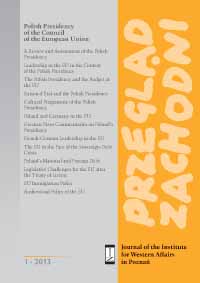A Review and Assessment of the Polish Presidency of the Council of the European Union
A Review and Assessment of the Polish Presidency of the Council of the European Union
Author(s): Janusz Józef WęcSubject(s): Politics / Political Sciences
Published by: Instytut Zachodni im. Zygmunta Wojciechowskiego
Summary/Abstract: The article provides an assessment of the Polish Presidency of the Council of the European Union. The author presents the operational and strategic programme (priorities) of the Polish Presidency, the limitations it encountered, and the major achievements and failures of the Polish government in the implementation of the set goals (their categorisation has also been presented). The most important achievements of the Polish Presidency include: adoption of a package of regulations reinforcing the control of public finances of the Member States of the Eurozone and the European Union; a compromise on the EU general budget for 2012; start of negotiations on the Multiannual Financial Framework for 2014-2020; initiation of the debate on the reform of the Cohesion Policy after 2013; continuation of work on the EU’s energy security; prolongation of the food aid programme for the most deprived EU citizens; further progress in the implementation of the EU enlargement strategy; the Eastern Partnership summit; completion of negotiations on the signing of the Association Agreement with Ukraine and beginning similar negotiations with Georgia and Moldova; continuation of the debate on the deepening of the internal market and sources of growth; legislative work on the introduction of a unitary patent protection system and new regulations in the area of freedom, security and justice. In assessing the failures it must be noted that they resulted mainly from the negative attitude of some EU Member States or third states to the Polish initiatives, while only a few can be attributed to negligence of the Presidency as such. The following certainly belong to the first category: the lack of a unified stand towards Belarus in the Warsaw Declaration; failure to sign the Association Agreement with Ukraine; lack of admission of Bulgaria and Romania to the Schengen area; failure to implement the set goals concerning a common policy on security and defence; lack of progress in accession negotiations with Turkey; lack of progress in works on the reform of the Schengen system. The second category of failures includes: a rather passive attitude of the Polish Presidency during the UN Climate Change Conference in Durban; failure to implement the set goals concerning the Common Agricultural Policy; lack of substantial progress in negotiations on the reform of the Common Fisheries Policy and in the area of the social and employment policy.
Journal: Przegląd Zachodni
- Issue Year: 349/2013
- Issue No: I ENG
- Page Range: 7-34
- Page Count: 28
- Language: English

